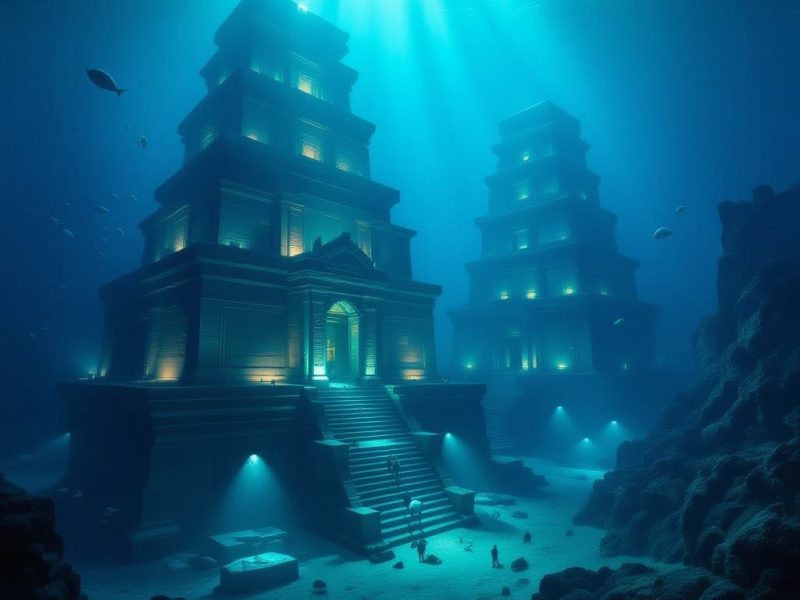Introduction: The Allure of Lost Worlds
Atlantis — a name that conjures visions of submerged temples, gleaming spires, and a civilization lost to time. Since Plato first described it in his dialogues around 360 BCE, Atlantis has fascinated mystics, scholars, and conspiracy theorists alike. But what if the myth isn’t entirely fictional? What if echoes of ancient advanced societies do exist beneath the sediment of history?
In 2025, cutting-edge technologies such as underwater LIDAR, AI-driven historical analysis, and quantum dating methods are peeling back the layers of time. From the coasts of the Mediterranean to the jungles of South America, we’re reinterpreting mythological accounts as possible historical records of real civilizations.
Atlantis in Plato’s Words
Plato’s account describes a mighty naval power located “beyond the Pillars of Hercules” (believed to be the Strait of Gibraltar). This empire, rich in resources and technology, supposedly fell out of favor with the gods and was swallowed by the sea in a single day and night.
For centuries, this tale was dismissed as allegory — a metaphor for hubris and divine retribution. However, modern interpretations suggest Plato may have based his story on real events or oral traditions passed down from even older societies.
Technological Rediscovery: Tools of Truth
1. Underwater Archaeology with AI
Autonomous underwater vehicles (AUVs) equipped with AI pattern-recognition software are now capable of detecting manmade structures on the ocean floor with unprecedented precision. Discoveries off the coasts of Spain, India, and Japan hint at submerged ruins that defy conventional dating methods.
2. Quantum Resonance Dating
A revolutionary method now allows scientists to detect vibrational frequencies from buried stone to determine construction eras. Using this technique, sites in Malta and Egypt show signs of activity over 10,000 years ago — centuries before the supposed rise of agriculture.
3. Myth as Data
AI tools are being trained to interpret mythology as datasets. Algorithms parse hundreds of myths to find recurring patterns, such as deluge stories, solar cataclysms, and migrating gods — suggesting possible shared memories of cataclysmic prehistoric events.
Similar Civilizations: Echoes Around the World
Göbekli Tepe (Turkey)
This megalithic site predates Stonehenge by over 6,000 years and suggests a complex society capable of sophisticated construction. It challenges the idea that organized religion and settlement followed agriculture — instead proposing the opposite.
Dwarka (India)
Off the coast of Gujarat lies a city whose structures suggest a lost civilization referenced in Hindu texts. Described in the Mahabharata as Lord Krishna’s kingdom, recent sonar and carbon findings suggest the city was submerged over 9,000 years ago.
Yonaguni Monument (Japan)
Controversial and dramatic, these underwater formations may be natural — or the last remnants of an East Asian Atlantis. Staircases, terraces, and possible inscriptions hint at lost knowledge, though scientific consensus remains divided.
The Astroscience Connection
Ancient cultures were stargazers. Many megalithic structures align perfectly with solstices, equinoxes, and stellar constellations. The Great Pyramids mirror Orion’s Belt. Teotihuacan follows the Pleiades. Could these alignments indicate advanced astronomical understanding — or communication with something beyond?
In the metaphysical realm, some suggest these civilizations were guided by beings from the stars — not aliens in a sci-fi sense, but interdimensional intelligences interpreted as gods, devas, or sky walkers. Astrology and sacred geometry were not superstition but encoded science.
Lessons for the Modern World
Whether Atlantis was a real city, a metaphor, or a misremembered tale, its story holds valuable lessons. Climate change, technological hubris, spiritual disconnect — these themes echo today. Ancient myths may be more than bedtime stories. They may be warnings.
By examining ancient wisdom through modern science, we open the possibility that humanity has risen and fallen more than once — and that remembering is the first step toward avoiding repetition.
Conclusion: The Pulse of the Forgotten
As we dive deeper — literally and metaphorically — into Earth’s lost past, the line between legend and history continues to blur. Atlantis may yet rise — not from the waves, but from the human imagination, backed by satellite data, sonar scans, and a curious collective mind.
The ancients may have whispered their truths in stone, song, and symbol. In 2025, it is our turn to listen, decode, and reconnect with the ancestral roots that stretch beyond written history and into the mythic ether.


